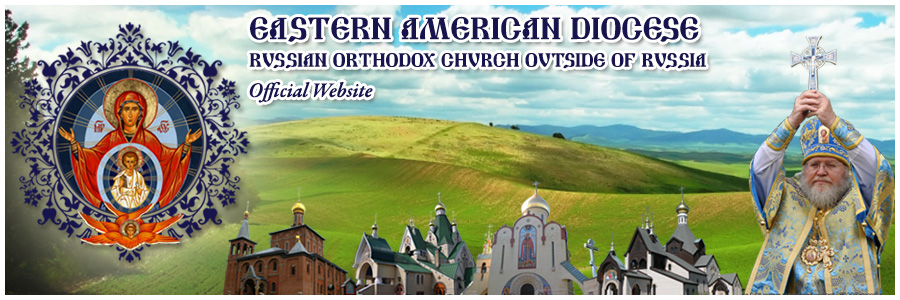
December 5, 2015
Howell, NJ: Monument to Reunification of Russian Orthodox Church
dedicated at Diocesan Center
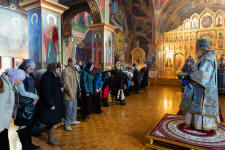 On
Friday, December 4, the great feast of the Entrance into the Temple
of the Most Holy Theotokos, a multitude of clergy, faithful, and
guests from the U.S. and Russia gathered at St. Alexander Nevsky
Diocesan Cathedral in Howell, NJ. Prior to entering the church, many
inspected the monument to two of our most distinguished
contemporaries: His Holiness, Patriarch Alexey II, and His Eminence,
Metropolitan Laurus, which was installed opposite the cathedral. On
this bright, sunny day, the feast at the Eastern American Diocesan
Center was twofold.
On
Friday, December 4, the great feast of the Entrance into the Temple
of the Most Holy Theotokos, a multitude of clergy, faithful, and
guests from the U.S. and Russia gathered at St. Alexander Nevsky
Diocesan Cathedral in Howell, NJ. Prior to entering the church, many
inspected the monument to two of our most distinguished
contemporaries: His Holiness, Patriarch Alexey II, and His Eminence,
Metropolitan Laurus, which was installed opposite the cathedral. On
this bright, sunny day, the feast at the Eastern American Diocesan
Center was twofold.
Celebrating the festal Divine Liturgy was Metropolitan Hilarion of
Eastern America & New York, First Hierarch of the Russian Church
Abroad. His Eminence as co-served by diocesan vicar Bishop Nicholas
of Manhattan, and clergy of the Diocese and Patriarchal Parishes in
the USA. The divine services were conducted under the aegis of the
Protectress of the Russian Diaspora: the Kursk Root Icon of the
Mother of God.
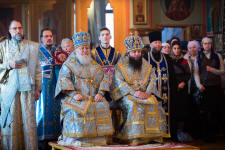 Prior
to the start of Liturgy, cathedral cleric Reader Peter Lukianov was
ordained a subdeacon, while altar server Aleksei Roschko was awarded
the right to wear the orarion.
Prior
to the start of Liturgy, cathedral cleric Reader Peter Lukianov was
ordained a subdeacon, while altar server Aleksei Roschko was awarded
the right to wear the orarion.
Before the communion of the faithful, Archpriest Victor Potapov,
rector of St. John the Baptist Cathedral in Washington, DC,
addressed the gathered worshipers with a sermon. Fr. Victor spoke
about the history of the radiant feast of the Entrance into the
Temple of the Most Holy Theotokos, reminding the Orthodox that "this
day calls to mind for us not only of the childhood of the Most Holy
Theotokos, but also the significance of raising our children and
grandchildren in church, because there is no better place for
children than the House of God." "If we will instruct our children
from infancy, if we will overcome our spiritual indolence and bring
them to church; if from their mother’s breast they will be
accustomed to regularly commune of Christ’s Holy Mysteries, then
this will be the surest defense for the next generation against the
pernicious influences of this world. And even if they later fall
from the path, rest assured that the seeds sown in their infancy
will make themselves known later in their lives," concluded Fr.
Victor.
Upon completion of the divine services, the bishops, clergy, and
faithful undertook a procession with the Kursk Root Icon from the
cathedral to the monument the Reunification of the Russian Orthodox
Church.
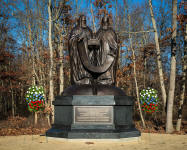 The
name of the new monument, "Reunification," expresses the core
content of the idea inlaid in the sculpture: the memory of the
historic event that ended the period of tragic division in the
Russian Church in the 20th century – the May 17, 2007 signing of the
Act of Canonical Communion between the Russian Orthodox Church
Outside of Russia and the Russian Church in the homeland.
The
name of the new monument, "Reunification," expresses the core
content of the idea inlaid in the sculpture: the memory of the
historic event that ended the period of tragic division in the
Russian Church in the 20th century – the May 17, 2007 signing of the
Act of Canonical Communion between the Russian Orthodox Church
Outside of Russia and the Russian Church in the homeland.
Imprinted in bronze are the figures of Patriarch Alexey II and
Metropolitan Laurus, holding in their hands Christ the Savior
Cathedral. The monument’s sculptor is Andrey Klykov, and the
project’s architects are Gennady and Anatoly Kuznetsov. As the
plaque on the plinth bears witness, the monument is "a gift to the
Russian Diaspora from the people of Orthodox Russia." Symbolically,
a nearly identical monument was installed on the territory of the
Nativity of the Mother of God "Kursk Root Hermitage" in the Kursk
Diocese. The only difference between the two is that, in the Kursk
monument, the two primates are holding the Kursk Root Icon of the
Mother of God, while in the American monument, they are holding
Christ the Savior Cathedral.
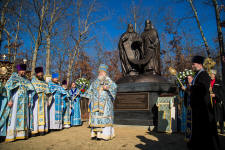 Opening
the ceremony of the blessing of the monument, Metropolitan Hilarion,
First Hierarch of the Russian Church Abroad, called the sculpture "a
remarkable memorial to two remarkable men." "Today, we dedicate in
the American land a monument to a great event in the life of the
United Russian Orthodox Church. For more than half a century, our
Russian people, bound by a common Faith, were deprived of the
ability to pray together at God’s Altar or to commune from One
Chalice. Time and ceaseless prayer were needed for the restoration
of Church unity. Eight years ago, these divisions were wiped away.
On the day of the signing of the Act of Canonical Communion, a new
world of the fullness of Orthodoxy and brotherly unity opened for
millions of Russian people on every continent. The question of
reuniting the Russian Church depended greatly on two men, who
piloted the Ark of Salvation – the Church – in those years: the Most
Holy Patriarch Alexey II and Metropolitan Laurus. They both
accomplished the greatest feat of their lives, fulfilling the will
of God and their historic destiny," noted His Eminence. He called on
the clergy and faithful to commemorate and thank the ever-memorable
primates for their labors in reuniting the two branches of the
Russian Church.
Opening
the ceremony of the blessing of the monument, Metropolitan Hilarion,
First Hierarch of the Russian Church Abroad, called the sculpture "a
remarkable memorial to two remarkable men." "Today, we dedicate in
the American land a monument to a great event in the life of the
United Russian Orthodox Church. For more than half a century, our
Russian people, bound by a common Faith, were deprived of the
ability to pray together at God’s Altar or to commune from One
Chalice. Time and ceaseless prayer were needed for the restoration
of Church unity. Eight years ago, these divisions were wiped away.
On the day of the signing of the Act of Canonical Communion, a new
world of the fullness of Orthodoxy and brotherly unity opened for
millions of Russian people on every continent. The question of
reuniting the Russian Church depended greatly on two men, who
piloted the Ark of Salvation – the Church – in those years: the Most
Holy Patriarch Alexey II and Metropolitan Laurus. They both
accomplished the greatest feat of their lives, fulfilling the will
of God and their historic destiny," noted His Eminence. He called on
the clergy and faithful to commemorate and thank the ever-memorable
primates for their labors in reuniting the two branches of the
Russian Church.
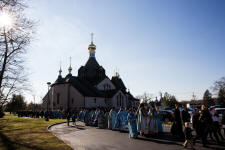 Also
taking part in the ceremony of the blessing of the monument were the
Consul General of the Russian Federation in New York City, Igor
Golubovsky, a delegation from Kursk led by deputy Vladimir Kharin of
the Regional Duma, and members of the Kuban Cossack Voisko.
Also
taking part in the ceremony of the blessing of the monument were the
Consul General of the Russian Federation in New York City, Igor
Golubovsky, a delegation from Kursk led by deputy Vladimir Kharin of
the Regional Duma, and members of the Kuban Cossack Voisko.
"Today we saw a long-awaited event that had to happen in the
American land," said the Consul General of the Russian Federation
Igor Golubovsky, addressing those gathered. "This monument is not
only a memorial to the Reunification that took place eight years
ago, but also a spiritual unity of parts of sacred Moscow with the
bearers of the Russian spirit and Russian culture, who by the will
of fate have found themselves outside of Russia. I look at this
monument, at the figures of these two visionary men, and I see that
their gaze is directed toward the future. The great deed that they
accomplished was done not only for us, but for future generations."
On behalf of the Russian ambassador, Sergey I. Kislyak, members of
Russia’s diplomatic corps in America, and himself, Golubovsky
thanked all those who dedicated even a small portion of their labors
toward the installation of the monument to the Reunification.
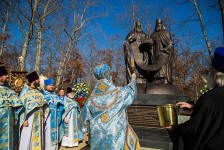 Metropolitan
Hilarion also addressed words of thanks to those who labored to
design and complete the sculpture. Architect Anatoly Kuznetsov,
director of the "Tserkov’" Fund, thanks to whom the idea of the
monument was brought to life, was awarded the Russian Church
Abroad’s highest honor: the Order of the Kursk Root Icon, 1st Class.
Diocesan gramotas were awarded to the sculptor, Evgeny Korolev, to
Kursk Duma deputy Vladimir Kharin, and to Valery Balakirev. The
Russian guests will relay the remaining gramotas to those awarded
who were not able to attend.
Metropolitan
Hilarion also addressed words of thanks to those who labored to
design and complete the sculpture. Architect Anatoly Kuznetsov,
director of the "Tserkov’" Fund, thanks to whom the idea of the
monument was brought to life, was awarded the Russian Church
Abroad’s highest honor: the Order of the Kursk Root Icon, 1st Class.
Diocesan gramotas were awarded to the sculptor, Evgeny Korolev, to
Kursk Duma deputy Vladimir Kharin, and to Valery Balakirev. The
Russian guests will relay the remaining gramotas to those awarded
who were not able to attend.
"In the five years during which we were developing this monument, it
became dear to us, and we wanted to give it into good hands," said
sculptor Evgeny Korolev. "Here, in America, we saw how the Russian
people approach the Orthodox Faith with trepidation, and we were
very glad to see the monument put in its rightful place." Korolev
expressed particular words of thanks to Metropolitan Hilarion, who
during the development of the sculpture found the time to come to
the workshop and support those who were laboring to create the
monument.
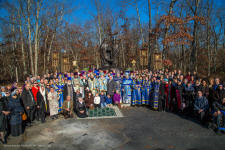
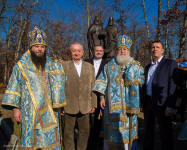 On
behalf of the Kursk Region and Metropolitan Herman of Kursk & Rylsk,
regional Duma deputy Vladimir Kharin greeted the clergy and
faithful. Kharin recalled meeting with the ever-memorable
Metropolitan Laurus in Kursk and planting a tree there with him. He
assured those gathered that collaboration between the people of
Kursk and the Russian Church Abroad will continue and be ever more
fruitful.
On
behalf of the Kursk Region and Metropolitan Herman of Kursk & Rylsk,
regional Duma deputy Vladimir Kharin greeted the clergy and
faithful. Kharin recalled meeting with the ever-memorable
Metropolitan Laurus in Kursk and planting a tree there with him. He
assured those gathered that collaboration between the people of
Kursk and the Russian Church Abroad will continue and be ever more
fruitful.
The feast of the Entrance of the Most Holy Theotokos is also
significant for the cathedral sisterhood, who celebrate the
anniversary of their foundation on this day. On this festal day, the
sisters prepared an abundant luncheon for the multitudinous clergy,
faithful, and guests, during which the warmhearted fellowship
continued.

Photos: A. Boldeskul
and G. Konyev
Media Office of the Eastern
American Diocese

